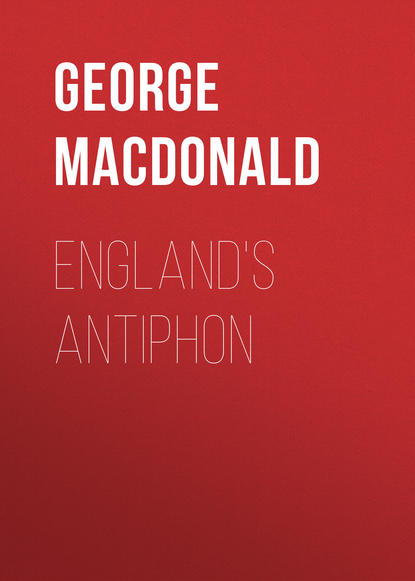По всем вопросам обращайтесь на: info@litportal.ru
(©) 2003-2025.
✖
England's Antiphon
Настройки чтения
Размер шрифта
Высота строк
Поля
Very little of the poetry of the fifteenth century is worthy of a different fate from that which has befallen it. Possibly the Wars of the Roses may in some measure account for the barrenness of the time; but I do not think they will explain it. In the midst of the commotions of the seventeenth century we find Milton, the only English poet of whom we are yet sure as worthy of being named with Chaucer and Shakspere.
It is in quality, however, and not in quantity that the period is deficient. It had a good many writers of poetry, some of them prolific. John Lydgate, the monk of Bury, a great imitator of Chaucer, was the principal of these, and wrote an enormous quantity of verse. We shall find for our use enough as it were to keep us alive in passing through this desert to the Paradise of the sixteenth century—a land indeed flowing with milk and honey. For even in the desert of the fifteenth are spots luxuriant with the rich grass of language, although they greet the eye with few flowers of individual thought or graphic speech.
Rather than give portions of several of Lydgate's poems, I will give one entire—the best I know. It is entitled, Thonke God of alle.[36 - A poem so like this that it may have been written immediately after reading it, is attributed to Robert Henryson, the Scotch poet. It has the same refrain to every verse as Lydgate's.]
THANK GOD FOR ALL
By a way wandering as I went,
Well sore I sorrowed, for sighing sad;
Of hard haps that I had hent
Mourning me made almost mad;[37 - "Mourning for mishaps that I had caught made me almost mad."]
Till a letter all one me lad[38 - "Led me all one:" "brought me back to peace, unity, harmony." (?)],
That well was written on a wall,
A blissful word that on I rad[39 - "That I read on (it)."],
That alway said, 'Thank God for[40 - Of in the original, as in the title.] all.'
And yet I read furthermore[41 - Does this mean by contemplation on it?]—
Full good intent I took there till[42 - "I paid good attention to it."]:
Christ may well your state restore;
Nought is to strive against his will; it is useless.
He may us spare and also spill:
Think right well we be his thrall. slaves.
What sorrow we suffer, loud or still,
Alway thank God for all.
Though thou be both blind and lame,
Or any sickness be on thee set,
Thou think right well it is no shame— think thou.
The grace of God it hath thee gret[43 - "Greeted thee"—in the very affliction.].
In sorrow or care though ye be knit, snared.
And worldés weal be from thee fall, fallen.
I cannot say thou mayst do bet, better.
But alway thank God for all.
Though thou wield this world's good,
And royally lead thy life in rest,
Well shaped of bone and blood,
None the like by east nor west;
Think God thee sent as him lest; as it pleased him.
Riches turneth as a ball;
In all manner it is the best in every condition.
Alway to thank God for all.
If thy good beginneth to pass,
And thou wax a poor man,
Take good comfort and bear good face,
And think on him that all good wan; did win.
Christ himself forsooth began—
He may renew both bower and hall:
No better counsel I ne kan am capable of.
But alway thank God for all.
Think on Job that was so rich;
He waxed poor from day to day;
His beastés died in each ditch;
His cattle vanished all away;
He was put in poor array,
Neither in purple nor in pall,
But in simple weed, as clerkes say, clothes: learned men.
And alway he thanked God for all.
For Christés love so do we;[44 - "For Christ's love let us do the same."]
He may both give and take;
In what mischief that we in be, whatever trouble we
He is mighty enough our sorrow to slake. [be in.
Full good amends he will us make,
And we to him cry or call: if.
What grief or woe that do thee thrall,[45 - "Whatever grief or woe enslaves thee." But thrall is a blunder, for the word ought to have rhymed with make.]
Yet alway thank God for all.
Though thou be in prison cast,
Or any distress men do thee bede, offer.
For Christés love yet be steadfast,
And ever have mind on thy creed;
Think he faileth us never at need,
The dearworth duke that deem us shall;[46 - "The precious leader that shall judge us."]
When thou art sorry, thereof take heed,[47 - "When thou art in sorry plight, think of this."]
And alway thank God for all.
Though thy friendes from thee fail,
And death by rene hend[48 - "And death, beyond renewal, lay hold upon their life."] their life,
Why shouldest thou then weep or wail?
It is nought against God to strive: it is useless.
Himself maked both man and wife—
To his bliss he bring us all: may he bring.
However thou thole or thrive, suffer.
Alway thank God for all.
What diverse sonde[49 - Sending, message: "whatever varying decree God sends thee."] that God thee send,
Here or in any other place,
Take it with good intent;
The sooner God will send his grace.
Though thy body be brought full base, low.
Let not thy heart adown fall,
But think that God is where he was,











